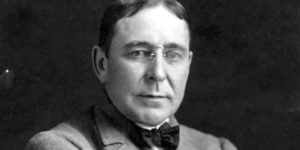Editor’s Note: Originally preached by J. Wilbur Chapman (1859-1917).
“If he hath wronged thee, or oweth thee ought, put that on mine account.” —Philemon 1:18
It was after Paul’s eventful voyage, after the shipwreck at Melita, after the meeting with his
friends at Apii Forum, and with the Roman soldier chained to his body, that this epistle to
Philemon was written. Paul had appealed unto Caesar in the charges made against him, and
he has now reached Rome that he might stand before the king. The Roman law was
exceedingly slow of action, and so it was at least two years before his case could be
presented. In all that time he tells us that he lived in his own hired house, and while he was
chained to the Roman soldier, still he had liberty to speak, and great numbers of people
flocked into his house to hear the story he had to tell.
What a picture it was! The little old man who was the preacher, with his heart on fire with love
for God, his face bearing the marks of his suffering, and also his joy, lifting his hand for the
sake of emphasis and causing the chains of his imprisonment to rattle, and yet writing the
greatest letters the world has ever read. It is not to be forgotten that the four epistles of the
imprisonment are counted his best effort. The letter to the Ephesians represents the body of
Christ, that to the Colossians represents the head of the body which is Christ, and that to the
Philippians stands for the glad experience that comes to a Christian when head and body are
perfectly united. The letter to Philemon was the fourth of the imprisonment epistles.
Among his hearers one day was Onesimus, a runaway slave. His master was Philemon, a
friend of Paul’s, and a convert in another city. Doubtless the slave had heard the apostle at
the time of his master’s conversion. Running away from his bondage, he sought him out in the
city of Rome. To the music of the clanking chains, the epistle was written.
Erasmus says that Cicero never wrote anything of greater elegance. Luther says that it is a
charming expression of Christian love, a real exhibition of Christian courtesy, a model of tact
and delicacy. See the shrewdness of the apostle in the eighth and ninth verses:
“Wherefore, though I might be much bold in Christ to enjoin thee that which is convenient, Yet
for love’s sake I rather beseech thee, being such an one as Paul the aged, and now also a
prisoner of Jesus Christ.”
It is as if he had said: “I am an apostle, and I might have enjoined thee to receive Onesimus,
but I rather appeal to thee for the sake of love, and I would awaken your sympathies because
I am an aged man. Better than all, I send you this entreaty and hope to move you, because I
am a prisoner in bonds.” The salutation contained in the first three verses is: “Paul, a prisoner
of Jesus Christ, and Timothy our brother, unto Philemon our dearly beloved, and
fellowlabourer, And to our beloved Apphia, and Archippus our fellowsoldier, and to the church
in thy house: Grace to you, and peace, from God our Father and the Lord Jesus Christ.”
Philemon was a man of influence, Apphia was his wife, and it is supposed that Archippus was
their son. Onesimus was their slave in bonds, and because of some hardship he had broken
away and hastened to Rome.
It is a difficult thing to imagine the condition of the Roman slave. Society at its best was
awful. What can we say of the dregs? If we would appreciate the text which is filled with the
spirit of the gospel, it is necessary that we should bear in mind certain things concerning the
Roman law. First, the Roman law gave a slave no right of asylum, but it granted him the
privilege of making an appeal. Secondly, the Roman slave had the privilege of fleeing to his
master’s friend, not for concealment, but for intercession. Thirdly, the owner of a slave in
Roman times was absolute in his possession, yet he might be besought by a friend whom he
counted as a partner. It was also agreed that a Roman slave could be adopted by his master
as a son, and thus alone could he be freed.
In the light of these thoughts the text begins to open up before us. We were God’s property,
and we ran away. Our sin was against God; for this reason it needs atonement. Resolutions
can never touch this side of sin, reformation can never wipe it out, but Christ’s atonement
meets the case perfectly. Secondly, the law gives to the sinner no right of appeal. The
standard of the law has never for a moment been lowered, but grace steps in and changes the
whole matter, and every sinner under grace has the privilege of appealing for divine help.
Thirdly, the sinner flees for refuge to Jesus, whom God counts a partner: “Who, being in the
form of God, thought it not robbery to be equal with God.” Fourthly, through faith in Christ we
are begotten as sons. It is impossible to understand this, but the Word of God, to which may
be added our experience, justifies us in believing that it is true, and being sinners we are thus
delivered from the bondage of sin and kept from its power. Fifthly, in this new relation we
return to God, and we are not received as slaves, but beloved as Christ Himself.
At the close of a battle in the days of the war, a young man was found dying on the battle-field.
A soldier stopped to render him assistance, and as he moistened his lips and made his
head rest easier, the dying man said: “My father is a man of large wealth in Detroit, and if I have strength I will write him a note, and he will repay you for this kindness.” And this was the letter he wrote: “Dear father, the bearer of this letter made my last moments easier, and helped me to die. Receive him and help him for Charlie’s sake.”
The war ended, and the soldier in tattered garments sought out the father in Detroit. He
refused to see him at first on account of his wretched appearance, “but,” said the stranger, “I
have a note for you in which you will be interested.” He handed him the little soiled piece of
paper, and when the great man’s eyes fell upon the name of his son, all was instantly
changed. He threw his arms about the soldier, and drew him close to his heart, and put at hisdisposal everything that wealth could make possible for him to possess. It was the name that
made the difference. And thus we stand on redemption ground, and as Onesimus bore the
letter to Philemon, so we stand before God in the name of Jesus Christ, and He speaks for us
as did Paul for the Roman slave.
“If he hath wronged thee, or oweth thee ought, put that on mine account.”
- He Answers for our Sin
Romans 8:3: “What the law could not do, in that it was weak through the flesh, God sending
His own Son in the likeness of sinful flesh, and for sin, condemned sin in the flesh.”
2 Corinthians 5:21: “He hath made Him to be sin for us, who knew no sin; that we might be
made the righteousness of God in Him.”
There are some things in this world so dreadful that we cannot look upon them; some things
are so horrible that the thought of them makes us sick; but there is nothing in this world so
horrible as sin and the thought of sin to Jesus Christ, and yet He became sin for us.
I once heard John McNeill say that of all the people in Jerusalem he thought Barabbas had the
best idea of the atonement of Jesus Christ. “You will remember,” said Mr. McNeill,” that he
should have been crucified, and Jesus released, but the order was exactly reversed. The door
of the prison swings open, and Barabbas is free, and as he comes out into the light of the day,
all the people seem to be hurrying in one direction. He hears that Jesus of Nazareth is to be
crucified. He stops a moment to think, and then he exclaims: “‘Why, that is the man who is dying in my stead! I will go and see him.’
“He pushes his way out through the gate of the city, and up the hillside until he reaches the
surging mob about the cross. He stands in the outer circle for a moment, and then pushes his
way to the very inner circle, and stands so near that he can reach out his hand and touch the
dying Savior. And,” said my friend, “I can hear him say:
“‘I do not know who you are, but I know that you are there in my stead.”‘
And said John McNeill: “Until you can give a better theory of the atonement, take that of
Barabbas — Christ your substitute, dying in your place.”
Sin was judged for us in Christ, and He stands before God saying, “Put that on mine account.”
- He Takes Away Sins
Galatians 1:4: “Who gave Himself for our sins, that He might deliver us from this present evil
world, according to the will of God and our Father.”
1 Corinthians 15:3: “For I delivered unto you first of all that which I also received, how that
Christ died for our sins according to the Scriptures.”
1 Peter 2:24: “Who His own self bare our sins in His own body on the tree, that we, being
dead to sins, should live unto righteousness: by whose stripes ye were healed.”
Our sins were like the sands of the sea in number; they were like scarlet and crimson in their
awfulness; but the Scriptures tell us that they are hurled as far as the east is from the west,
which is a distance that can never be measured. They tell us that they are cast behind God’s
back, and that is surely comforting, for when I come to God as a sinner, my sins stand
between me and God, and when I confess Jesus Christ as my Savior, God takes these same
sins and puts them behind His back so that now God is between me and my sins. The
Scriptures also declare that when our sins are confessed and forsaken, God remembers them
against us no more forever. And when they rise at the judgment, ONE stands before God inour behalf, with pierced hands, and thorn-marked brow, saying, “Father, put that on mine
account.”
III. He Answer For Our Failures
1 John 2:1: “My little children, these things write I unto you, that ye sin not. And if any man
sin, we have an advocate with the Father, Jesus Christ the righteous.”
This is the high ideal — “that ye sin not” — but have you ever thought of the difference
between Christ as the high priest, and as the advocate? As the high priest, He was in all points
tempted as we are, yet without sin; so that in all the temptations that come to you and to me,
He stands in the position as priest, and His sympathy for us is infinite. But if for any reason we
should make a mistake, and fail, then He becomes our advocate, making intercession for our
forgiveness; in other words, He is the high priest up to the point of sin, and from that point He
is an advocate.
1 John 1:8,9: “If we say that we have no sin, we deceive ourselves, and the truth is not in us.
If we confess our sins, He is faithful and just to forgive us our sins, and to cleanse us from all
unrighteousness.”
I do not find any place in the New Testament, with the possible exception of the Lord’s Prayer,
which was given before the atoning death on Calvary, where it is said that a Christian needs to
ask for forgiveness of sin. It is only said that we must confess our sins; and the moment a
confession is made, He stands before God to say, “Father, put that on mine account.”
- He Takes Our Cares
Matthew 11:28: “Come unto me, all ye that labour and are heavy laden, and I will give you
rest.” God never intended that His children should be disconsolate or discouraged.
Philippians 4:7: “And the peace of God, which passeth all understanding, shall keep your
hearts and minds through Christ Jesus.”
It is always well for us, when we are tempted to be discouraged, to remember the Apostle
Paul. He was chained to a Roman soldier, and yet in this one letter to the Philippians again
and again he exclaims: “Rejoice! rejoice! and again I say, rejoice!” He it is who says: “Be careful for nothing; but in everything by prayer and supplication with thanksgiving let your requests be made known unto God.”
I can understand how some will say that this is impossible, that a man of business has too
many cares and too many anxieties to be careful for nothing; but some one has pointed out
the fact that we begin to read at the wrong place — we should read the closing clause of the
fifth verse: “The Lord is at hand.” And this makes all the difference. If the Lord is at hand, I
need not be over anxious. If the Lord is at hand, no burden shall weigh me down. Paul gives
us the secret of it when he says that by prayer we shall overcome, and Payson says God gives
His answers more to the habit than to the act of prayer. But there is still something more that
Paul says of prayer; he calls it supplication. This is more intense. It means to bring your sins,
your cares, your family, your business, and putting them all together, to bear them before
God. Anything but a stilted prayer.
If our children should ask us for blessings as we ask God for help, we would think they had
lost their reason. Mr. S. H. Hadley says that when he was converted, Jerry McCauley said to
him: “You pray.”
Mr. Hadley said to him, with a sob: “I cannot pray. You pray for me.”
Then Jerry McCauley, putting his arms around him, offered up this prayer: “Dear Jesus, these
poor fellows have gotten themselves into an awful hole. You helped me out. Please help them.
Amen.”
Mr. Hadley said this was the first time he had ever heard a real prayer. Scripturally, the only
way to pray is unto God through Christ by the Spirit, and every such prayer Jesus receives
and exclaims: “Father, answer it, and put it on mine account.”
- He Still Stands Besides Us In Death.
Hebrews 2:10: “For it became Him, for whom are all things, and by whom are all things, in
bringing many sons unto glory, to make the captain of their salvation perfect through
sufferings.”
Death is still an enemy, but Jesus met him, and won the victory; and when we meet him, He
shall stand beside us to say: “Put that on mine account.” Death is a vanquished enemy, and
Christ now uses him to put His children to sleep.
“Aren’t you afeared, John?” said the wife of a Cornish miner as he was dying. “Afeared, lass! why should I fear? I ken Jesus, and Jesus kens me.
An old pilot died not long ago in Boston. He had held the pilot’s commission for nearly seventy-five
years; and for almost all that time he was a follower of Jesus Christ. As he was passing
away, his face brightened, and he started up with this expression: “I see a light.”
His friends thought his mind was wandering, and that he was in imagination on the sea, and
they said: “Is it the Highland light?” He said: “No.”
A moment more, and he repeated the sentence: “I see a light.” They asked him again: “Is it the Boston light?” And he answered: “No.”
For the third time he said: “I see a light.” They said again: “Is it the Minot light?” “Ah, no,” he said, “it is the light of glory! Let the anchor go!”
And they slipped the anchor, and the old pilot stood before Him who had taken him in His
arms, and presented him without spot or blemish before His Father, saying:
“My Father, every weakness, every failure, every sin in all this life, put on mine account.”









